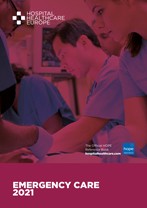A study has found that while anticoagulant/antiplatelet use in older, major trauma patients increases their risk of in-hospital mortality, six months later, there was no adverse effect of these drugs on functional outcomes.
The main use of anticoagulant drugs is to prevent thromboembolic events linked with atrial fibrillation, mechanical heart valves and deep vein thrombosis. Although anticoagulants are an effective form of treatment, the drugs are associated with an increased risk of bleeding. Moreover, the proportion of older patients experiencing major trauma has doubled from 2007 to 2016, increasing by around 4.3% per year and attributable to a greater number of falls and transport-related events.1 While greater use of anticoagulants such as warfarin has been shown to be an independent predictor or mortality in trauma patients,2 other data have not supported this conclusion.3 Furthermore, there are few data on the long-term outcome of trauma patients prescribed anticoagulants.
With such a lack of data, a team from the School of Public Health and Preventative Medicine, Monash University, Melbourne, Australia, sought to quantify the association between anticoagulant and antiplatelet use and the short- and long-term outcomes in older patients with major trauma.4 They included all older (defined as 65 years and older) hospitalised trauma patients from 2017 to 2018 and retrieved the information from the Victorian State Trauma System (VSTR), a population-based registry that collects data on all hospitalised trauma patients in Victoria, New South Wales, Australia. Using the VSTR, the researchers included patients who met the following inclusion criterion: death due to injury, higher injury severity scores (> 12 on the Abbreviated Injury Scale), admission to intensive care for more than 24 hours and requiring mechanical ventilation for part of their stay, urgent surgery, 20–29% total body surface area partial or full thickness burns. The team also extracted drug information, including those prescribed either an anticoagulant or antiplatelet, categorising patients as: anticoagulant users, antiplatelet users and non-anticoagulant users. Groups were compared in terms of in-hospital mortality, length of hospital stay and Extended Glasgow Outcome Scale (GOS-E) at six months after their injury. The GOS-E categories patient function into eight different categories, with upper values indicating good recovery.
Findings
A total of 1323 patients were eligible for inclusion in the study, of whom 18.8% were prescribed anticoagulants and 28.7% antiplatelets. Among those taking anticoagulants, the majority (45.8%) were aged 75–84 years of age and 59.4% were males. The most common major trauma was a subdural haematoma (45.6%). In-hospital mortality was 31.7% among those taking anticoagulants and after adjustment for age and various other factors, the risk of in-hospital mortality was significantly higher compared with the non-anticoagulant group (odds ratio, OR = 2.38, 95% CI 1.58–3.59). Similarly, the adjusted odds ratio for those prescribed antiplatelets was also higher than non-users, although the difference was not significant (OR = 1.12, 95% CI 0.74–1.71). When comparing the GOS-E at 6 months, there was no evidence of an association between GOS-E scores and anticoagulant use (OR = 0.71, 95% CI 0.48–1.05) or antiplatelets (OR = 1.02, 95% CI 0.73–1.42).
The authors concluded that while there was evidence of an effect of both anticoagulants and antiplatelets with in-hospital mortality after a major trauma, there was no evidence of an association between function and anticoagulant use after six months.
References
- Beck B et al. Major trauma in older persons. BJS Open 2018;2(5):310–18.
- Lecky FE et al. The effect of preinjury warfarin use on mortality rates in trauma patients: a European multicentre study. Emerg Med J 2015;32(12):916–20.
- Kennedy DM et al. Impact of preinjury warfarin use in elderly trauma patients. J Trauma 2000;48:451–3.
- Sato N et al. Association between anticoagulants and mortality and functional outcomes in older patients with major trauma. Emerg Med J 2021 doi:10.1136/emermed-2019-209368.





